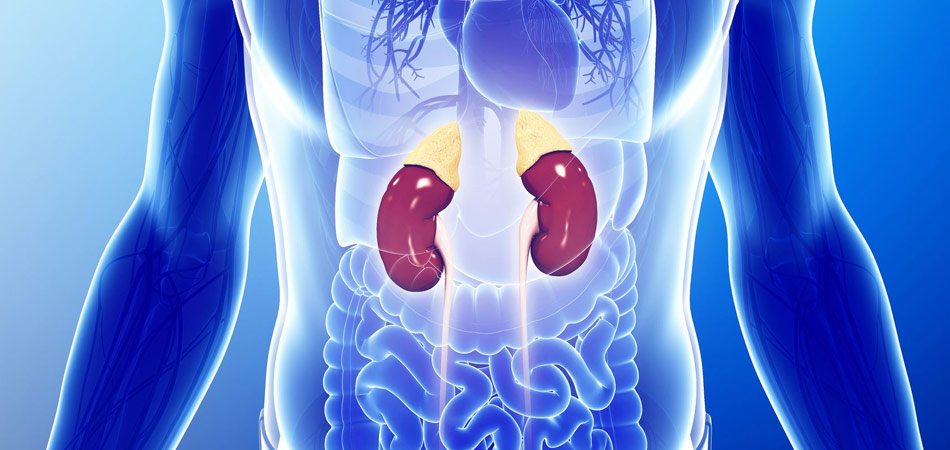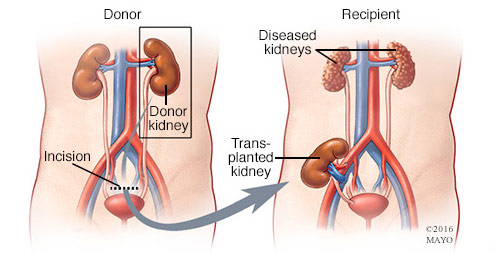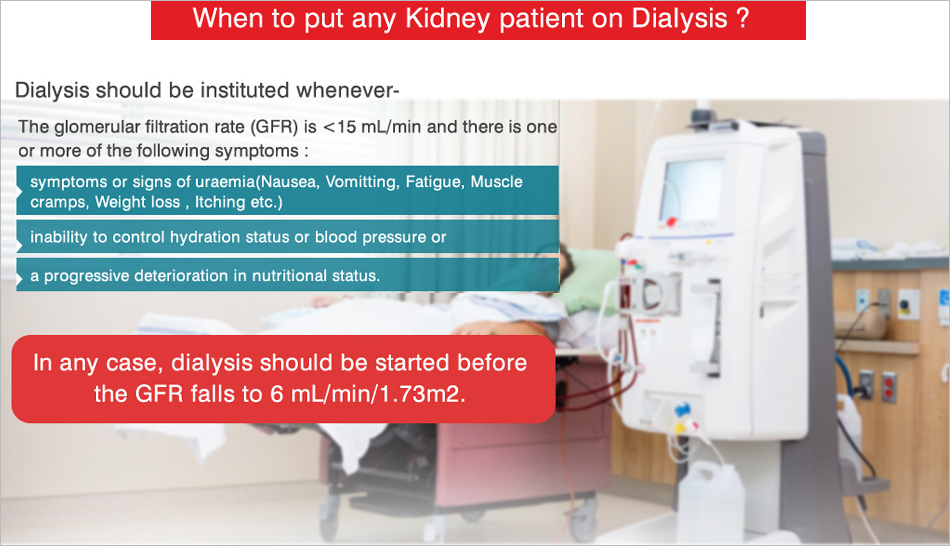Delhi | Kolkata
Bangalore | Chennai
Kidney Transplant in India

Why Kidneys are important for us ?
Kidneys are one of the most important organs of the human body. The chief function of the two kidneys, which are bean shaped is to filter about 170 litres of blood daily and therefore help the body by excreting out the waste as urine thereby, keeping the body healthy. Apart from it, the kidneys also regulate our blood pressure and also play an important role in producing the red blood cells as well as strengthen our bones.
Therefore, if anything goes wrong with our kidneys, all these functions become compromised and the person might suffer from a symptoms such as trouble sleeping, fatigue, inability to concentrate, dry, itchy skin, increased or decreased urination, blood in urine, foamy urine and puffiness around eyes or ankles.
If any person notices or suffer from such symptoms, it becomes very important to consult a medical specialist.

When it is Someone needs a Kidney Transplant ?
When a person suffers from Chronic kidney disease and they stop functioning and wastes and fluids start to build up, it is when suggestive of that person requires a Kidney transplant. This means, Kidney transplant may be the only option left for those patients whose kidneys have completely stopped functioning, which is being called as End Stage Renal Disease (ESRD) in medical terms.
A set of diagnostic tests are used to confirm the problem. Among the various blood tests, Serum Creatinine level (SCL), Glomerular Filteration Rate (GFR) and Blood Urea Nitrogen(BUN) are used.

Creatinine is a waste product produced from wear and tear of body muscles. Usual Ranges are 1.2 and 1.4 for Women and men respectively. Any value, >1.2 for women and > 1.4 for men is suggestive of Kidney disease. As the value of creatinine rises, it is indicative of progression of kidney disease.
GFR is a test measure how well the kidneys are removing the body wastes and excess fluids from the blood. The Normal range of GFR is 90 and above. If GFR values goes below 60, then it is clear cut sign of the fact that the kidneys are not functioning properly and anything below 15 is indicative of Kidney Failure.
The Urea Nitrogen is a byproduct from the proteins that we eat and its normal range is 7 to 20. If the Blood Urea Nirogen level (BUN) increases over 20, then it is indicative of Kidney ailment.

Any Patient having ESRD will require dialysis to survive. However a kidney transplant can remove the dependency of the patient on dialysis for the rest of their lives.

How to go about kidney transplant?
In case, the Kidneys are not functioning properly, then Kidney transplant should be the last option. Appropriate Specialists (Kidney Specialists/ Urologists) should be consulted and all possible option should be tried to recover the damaged kidney(s) till last point before resorting to Kidney Transplant.
When the patient is left with no other option except kidney transplant then doctor will check whether the patient has the health condition to undergo transplant surgery. For example, If the patient has heart or other diseases and is on dialysis but in majority of times it is seen that they can't have transplant).
Once the patient or the family members decides to go for Kidney Transplant, then one the following things could be useful to go about Kidney Transplant in a systematic way :
Ensure to choose right hospital with maximum successful rate of kidney transplants. Do research about the doctor, facilities, success rate etc. For this take advice, as well as go for second medical opinion to be clear about the things and process.
Once the family and patient has decided, then the next thing is that the patient will require a live kidney donor from family. The reason for it is that the family member (blood relation) has better chances of favorable cross match results and less chances of kidney rejection. Though the trend has also been seen earlier and through a number of reports that an unrelated person not belonging to family approves of been a donor, either because of some financial issue or monetary gain, but it is illegal in the eyes of law and should not be encouraged.
Once the donor from family has been recognized, who wish to donate his/her kidney to the needy family member (the patient), from there then, the actual treatment begins. The first step is to go for HLA (Human Leucocyte Antigen) typing and cross match reports. HLA Typing and Cross match are Laboratory tests to confirm the chances of acceptance or rejection by the patient's body to accept the donor's kidney.
In case, the HLA Tying Report and the Cross Match is confirmed, then the donor and recipient patient are been asked to go for complete health scan to know the Current COMPLETE HEALTH STATUS (for eg. urine, blood, ECG, X-ray, CT-scan etc) of both of them.
In case, the HLA Typing and Cross match is okayed, one has to undergo legal process to get permission for kidney transplant. This is a very important step. This is done through an authorization committee. It is important to state over here that Hospital-based or institution-based authorization committees should be made if each hospital does more than 25 transplants in a year. No transplantation team of the institution would be a member of respective authorization committees. Compositions of hospital-based, state-level authorization committee have been clearly defined, where government official, transplant hospital representative, patient representative as well as donor representative are present and whole process is been video-recorded. If transplantation is between near relatives, then authority for permission is competent authority. If transplantation is between other than near relatives or foreigner donor/recipient, then the authority of permission is authorization committee. All the documents needs to be kept in order so as to prove the relationship between Recipient and Donor. The authorization panel verifies all the required reports/files as well as the donor-recipient relationship and approve the transplant surgery, if everything is fine.
Then, depending on the earlier scheduled transplant surgeries(which are pending), the patient's family will be given a date for surgery. Once that is confirmed, both the receipient and the donor need to be admitted 2 - 3 dates prior to the transplant. Once it is established that the both of them are stable, the procedure is undertaken. Usually the transplant surgery requires 3-4 hours and once performed, both the recipient and the donor are kept in ICU/CCU for vitals monitoring and recuperating.
The donor can get discharged in 3-4 days whereas the recipient patient usually takws around 1 to 2 weeks. If the patient is stable, then post surgery usual recovery takes around 4-6 weeks to get back to the usual routine. However, it is utmost important to note that the recipient needs to take precautions and medications for lifetime.
FAQs on Kidney Transplant?
Q. What is the life of the kidney which has been donated ?
Ans. Usually, the life of a kidney which is being donated is 12 years, however if the patient strictly adheres to the rules and follows strict lifestyle discipline, the donated organ can work even upto 20 years. Strictly speaking, those patient around 40 years, 50 years and over 60 years can expect life expectancy around 22, 16 and ~ 12 years respectively.
Q. Can the patient be physically fit to get around do normal routine activities ?
Ans. Yes, if the patient maintains a disciplined lifestyle which includes, nutrition and physical activity, medications and do's and don'ts, there are absolutely no problems and patient can lead a healthy life
Q. What diet precautions one needs to take after kidney transplant ?
Ans. The recommended diet for patients of kidney transplant must include having atleast 5 servings of fresh vegetables and fruits per day which should have enough fibre in the diet. The diet can include lean meat, fish, poultry and should have low salt and low fat. Apart from this, enough water for hydration and adequate phosphorus and calcium levels should be maintained through dairy intake.
Q. What is the cost of the transplant procedure?
Ans. It varies from hospital to hospital and city to city. Usually metropolitan big (5 - 7 star hospitals cost more as compared to 3-4 star hospitals. But generally cost can range between 5 - 7 lakhs, where the Surgery itself might cost around 2.5 - 3.5 lakh, Immuno-suppression injections (2) - around 1.5 lakhs with other associated costs of care such as HLA tying & DSA test (~ 40,000), Hospitalization, Medications etc. After the surgery, it could cost Rs. 15,000 a month for the after care and another Rs.10,000 a month for immunosuppressive drugs.
Q. What is the success rate of kidney transplant in India ?
Ans. The current success rate of Kidney transplant is around 90%, one among the highest in the world.
Q. Will my new transplanted kidney start working immediately after the surgery ?
Ans. It all depends on how good a match is between the donor's and recipient body. The transplanted kidney can start working the same day after the surgery or might take a few days to weeks before beginning to function effectively.
* Conditions Apply

